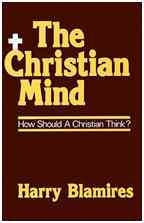The Christian mind…

“There is no longer a Christian mind.”
We speak of ‘the modern mind’ and of ‘the scientific mind,’ using the word mind of a collectively accepted set of notions and attitudes. … [I]n contradistinction to the secular mind, no vital Christian mind plays fruitfully, as a coherent and recognizable influence, upon our social, political, and cultural life.
It is a commonplace that the mind of modern man has been secularized. For instance, it has been deprived of any orientation towards the supernatural.
As tragic as this is, it would not have been so desperately tragic had there been a Christian mind that “held out against the secular drift.”
It is this “desperately tragic” situation that Harry Blamires goes on to chronicle in the first section of The Christian Mind: How Should A Christian Think? Three quotes from the first chapter, “The Surrender to Secularism,” provide a window into Blamires’ argument:
Except over a very narrow field of thinking, chiefly touching questions of strictly personal conduct, we Christians in the modern world accept, for the purpose of mental activity, a frame of reference constructed by the secular mind and a set of criteria reflecting secular evaluations.
The mental secularization of Christians means that nowadays we meet only as worshipping beings and as moral beings, not as thinking beings.
Without denying the impact of important isolated utterances, one must admit that there is no packed contemporary field of discourse in which writers are reflecting christianly on the modern world and modern man.
In the 50 years since the publication of The Christian Mind, there has been a significant response to Blamires’ cryptic assessment that “There is no longer a Christian mind.” Books, articles, and talks have been produced by such diverse thinkers as John R. W. Stott, David Gill, J. P. Moreland, Mark Noll, Bradley Green, James Sire, David Dockery, John Piper, Gene Edward Veith, Alister McGrath, Os Guinness, and David Naugle. And the latest entry into this growing “field of discourse” arrived in my mail recently from Union University — “Renewing Minds: A Journal of Christian Thought.”
It’s important to note that Harry Blamires did not leave the task for developing a Christian mind to future writers. The second part of his book provides individual chapters that deal with “The Marks of the Christian Mind”: Its Supernatural Orientation, Its Awareness of Evil, Its Conception of Truth, Its Acceptance of Authority, Its Concern for the Person, and Its Sacramental Cast.
Over the next weeks and months, I will be introducing many of the resources various thinkers have provided for developing and exercising a Christian mind. Still, a proper understanding of the “Christian mind” will require a close reading of The Christian Mind, the book that first generated the discussion of “how should a Christian think?”


 August 8, 2012
August 8, 2012 







Comments are closed.